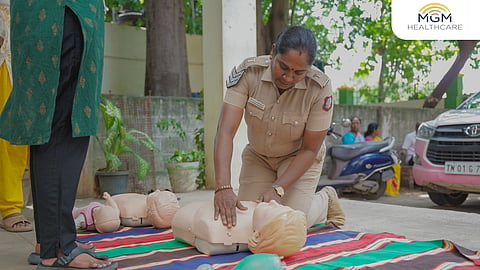

MGM Healthcare conducted a free heart health screening and counselling programme for over 1,000 police personnel from Chennai and neighbouring districts, with a strong focus on prevention and timely intervention to reduce long-term cardiovascular risks. As part of the initiative, senior cardiologists from the hospital also delivered talks on heart health, early detection, and preventive measures.
The programme, organised in association with the Greater Chennai Police to mark World Heart Day (observed annually on September 29), was held across three sessions on September 20, 23, and 27.
The hospital also provided Basic Life Support (BLS) training for the police to impart skills in cardiopulmonary resuscitation (CPR), paediatric life support, and other critical first-responder life-saving procedures.
In his comments, Dr. Jyotirmaya Dash, Senior Consultant, Interventional Cardiology, MGM Healthcare, said, “Cardiovascular disease has become one of India’s biggest health challenges, accounting for nearly 27% of all non-communicable disease deaths. Today, one in four deaths in the country is linked to heart-related conditions, and worryingly, heart attacks are striking Indians almost a decade earlier than the global average. This makes it absolutely vital to focus on early detection, preventive screening, and awareness. Through this initiative, we are not only training police personnel in life-saving Basic Life Support (BLS) skills but also empowering them to take charge of their own heart health.”
Dr. Babu Ezhumalai, Senior Consultant, Interventional Cardiology, MGM Healthcare, said, “In India, we are witnessing a worrying trend: young people are becoming increasingly vulnerable to cardiovascular disease. Studies show that 50% of heart attack deaths in Indian men occur before age 50, and about 25% of heart attacks now happen in people under 40. Factors like stress, poor diet, sedentary lifestyle, and rising obesity are driving this early surge. However, with proper lifestyle modifications—such as healthier food choices, regular physical activity, good sleep, and stress management—along with routine screenings for blood pressure, cholesterol, and glucose, and timely medical support, these risks can be significantly reduced, enabling young people to lead longer, heart-healthy lives.”